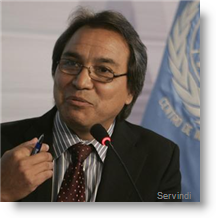 Indigenous people in Peru have suffered “devastating consequences” as a result of extractive industries in the Amazon rainforest, the United Nations’ Special Rapporteur on Indigenous Rights said Friday.
Indigenous people in Peru have suffered “devastating consequences” as a result of extractive industries in the Amazon rainforest, the United Nations’ Special Rapporteur on Indigenous Rights said Friday.
James Anaya’s comments followed a week-long visit in Peru, to government authorities, private companies and indigenous communities in the Amazon region of Loreto and the Andean and Amazon regions of Cusco and Puno. His trip in Loreto was to indigenous territory in the northern region that has been contaminated as a result of the oil industry.
The area in question that Anaya visited is Block 192, formerly called Block 1AB. Contamination in the area by oil and gas companies has been well documented. Last month, Peru’s environmental regulator OEFA fined Argentine oil and gas company Pluspetrol $7.15 million for contamination and the disappearance of a small lake in the area.
According to OEFA, Pluspetrol affected the lake with hydrocarbon liquids, caused unrecoverable ecological losses, and the removal of soil without an environmental management permit. It also said that the company failed to inform OEFA about the damage to the lake. The oil company denied wrongdoing and said the contamination was caused by previous operators.
Anaya said that indigenous leaders he met in the area told him that they are not opposed to development, but it should respect their rights and their resources.
“An example of the various negative experiences of natural resources in Peru is the situation of indigenous people in the Pastaza, Tigre, Corrientes and Marañon river basins,” said Anaya. “These people, for more than four decades, have been affected by oil exploitation in Block 1-AB in the department of Loreto.”
“I have been able to personally confirm the serious environmental problems that exist in this zone due to the oil industry,” he added. “This includes the contamination of the body of waters and the soil used by the indigenous people in this region, which has affected their food sources and their health.”
Anaya called on the government and the oil company to increase environmental remediation efforts in Block 1-AB.
Natural resource development in the Amazon has led to bloody conflicts in recent years between indigenous opponents of activities and government security forces. The issue reached a peak in 2009, when more than 30 people were killed during protests at Bagua, on an isolated stretch of highway in the northern region of Amazonas.
The highway was being intermittently blocked by indigenous groups in protest of the government’s refusal to recognize their right to prior consultation on development in their territories. They opposed a series of executive decrees signed by President Alan Garcia that would further facilitate private-sector and foreign investment in the Amazon rainforest as part of Peru’s free trade agreement with the United States. The government sent in special police troops with helicopters to stop the road blockade.
Anaya, elected to his UN post in 2008, visited Peru at the time, which he recalled in his statement made this past week.
“More than four years after the Bagua events, there is no doubt that there has been important progress in indigenous matters in the country, including regarding the extractive industries,” he noted. “Today, Peru is one of the few countries in the world that has a law on the consultation with indigenous peoples,” he added, but also said it should be noted that there are still concerns among some of the indigenous representatives on various aspects of the law and its regulations, enacted in 2012.
President Ollanta Humala’s administration has sought to resolve the disputes over natural resource development in Peru by signing legislation that would ensure indigenous people are consulted prior to the development of nearby projects. While the prior consultation law was approved by Congress in 2011, its implementation has been slow-going and it is still unclear if it will help resolve disputes.
Anaya said that its implementation will only be successful if mutual trust is built between indigenous people and the Peruvian state, which could be a challenge that would take many years to address.
“Indigenous people in Peru have suffered for many years the devastating consequences of extractive projects in their territories, a history that has resulted in a deterioration of relations between indigenous people and the state that still needs to be overcome,” he said.
“As I have emphasized in the past, the challenge now is to ensure that prior consultation is implemented according to the relevant international standards,” Anaya said.
The prior consultation law was passed by Peru in order to comply with the International Labour Organization’s Convention 169, of which Peru is a signatory.





